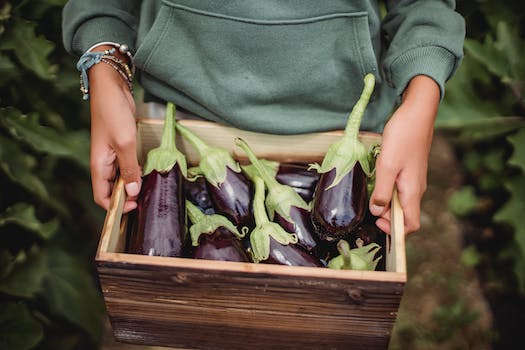Eggplant is a popular vegetable that is enjoyed in many dishes around the world. It is a versatile and nutritious vegetable that can be cooked in a variety of ways. Growing eggplant is a rewarding experience that requires patience and knowledge of the different stages of growth. Knowing the different stages of eggplant growth can help you ensure that your plants are healthy and productive. This article will provide an overview of the different stages of eggplant growth, from planting to harvesting.
Understanding the Different Growing Stages of Eggplant: What to Expect
Eggplant is a popular vegetable that is enjoyed in many dishes around the world. It is a versatile ingredient that can be cooked in a variety of ways, from grilling to baking. Knowing the different growing stages of eggplant can help you understand when to harvest the vegetable and how to best prepare it.
The first stage of eggplant growth is germination. This is when the seed begins to sprout and the plant starts to grow. The seed will need to be kept moist and warm in order to germinate. Once the seed has germinated, the seedling will emerge and the plant will begin to grow.
The next stage of eggplant growth is the vegetative stage. During this stage, the plant will begin to produce leaves and stems. The leaves will be a deep green color and the stems will be thin and fragile. The plant will need plenty of sunlight and water during this stage in order to grow properly.
The third stage of eggplant growth is the flowering stage. During this stage, the plant will produce white or purple flowers. These flowers will be the precursor to the eggplant fruit. The flowers will need to be pollinated in order for the fruit to form.
The fourth stage of eggplant growth is the fruiting stage. During this stage, the eggplant fruit will begin to form. The fruit will be a deep purple color and will be firm to the touch. The fruit will need to be harvested when it is ripe in order to get the best flavor.
Knowing the different growing stages of eggplant can help you understand when to harvest the vegetable and how to best prepare it. With proper care and attention, you can enjoy a delicious eggplant dish.
How to Maximize Yields During the Early Stages of Eggplant Growth

Eggplant is a popular vegetable that is easy to grow and can be harvested in a relatively short amount of time. However, in order to maximize yields during the early stages of eggplant growth, there are several steps that should be taken.
First, it is important to select the right variety of eggplant for the climate and soil conditions. Different varieties of eggplant have different requirements for temperature, soil type, and water. Choosing the right variety for the local conditions will ensure that the plants are able to thrive and produce a high yield.
Second, it is important to provide the plants with adequate amounts of sunlight. Eggplants need at least six hours of direct sunlight each day in order to grow and produce a high yield. If the plants are not receiving enough sunlight, they may become stunted and produce fewer fruits.
Third, it is important to provide the plants with adequate amounts of water. Eggplants need to be watered regularly in order to stay healthy and produce a high yield. The soil should be kept moist but not soggy. Overwatering can lead to root rot and other problems.
Fourth, it is important to fertilize the plants regularly. Eggplants need a balanced fertilizer that contains nitrogen, phosphorus, and potassium. Applying fertilizer every two to four weeks will help the plants to grow and produce a high yield.
Finally, it is important to provide the plants with adequate amounts of air circulation. Eggplants need plenty of air circulation in order to stay healthy and produce a high yield. If the plants are overcrowded, they may become stunted and produce fewer fruits.
By following these steps, it is possible to maximize yields during the early stages of eggplant growth. With the right variety, adequate sunlight, water, fertilizer, and air circulation, eggplants can produce a high yield of delicious fruits.
Tips for Successfully Transplanting Eggplant Seedlings to the Garden
1. Choose a sunny spot in the garden with well-draining soil. Eggplant seedlings need at least six hours of direct sunlight each day and soil that is not overly wet.
2. Prepare the soil for transplanting. Work in a layer of compost or aged manure to the soil to help the seedlings get off to a good start.
3. Dig a hole for each seedling that is twice as wide and just as deep as the seedling’s root ball.
4. Gently remove the seedling from its container and place it in the hole. Make sure the top of the root ball is level with the soil surface.
5. Backfill the hole with soil and lightly tamp it down.
6. Water the seedlings thoroughly after transplanting.
7. Mulch around the seedlings to help retain moisture and keep weeds at bay.
8. Monitor the seedlings for signs of stress, such as wilting or yellowing leaves. If the seedlings appear to be struggling, water them more frequently.
9. Fertilize the seedlings every two weeks with a balanced fertilizer.
10. Harvest the eggplants when they are firm and glossy.
Q&A
Q: What is the germination stage of eggplant?
A: The germination stage of eggplant is when the seed is planted in the soil and begins to sprout. This is the first stage of growth and can take anywhere from 5-10 days.
Q: What is the flowering stage of eggplant?
A: The flowering stage of eggplant is when the plant begins to produce flowers. This is usually around 4-6 weeks after the germination stage.
Q: What is the harvesting stage of eggplant?
A: The harvesting stage of eggplant is when the fruit is ready to be picked. This usually occurs around 8-10 weeks after the germination stage.
Conclusion
In conclusion, eggplant is a versatile and rewarding vegetable to grow. It requires a long growing season and plenty of sun, but with the right care and attention, it can produce a bountiful harvest. The stages of eggplant growth are seedling, flowering, and fruiting, and each stage requires different care and attention. With the right knowledge and care, eggplant can be a great addition to any garden.
